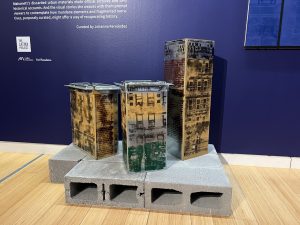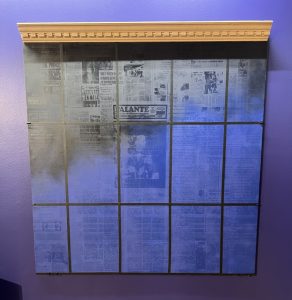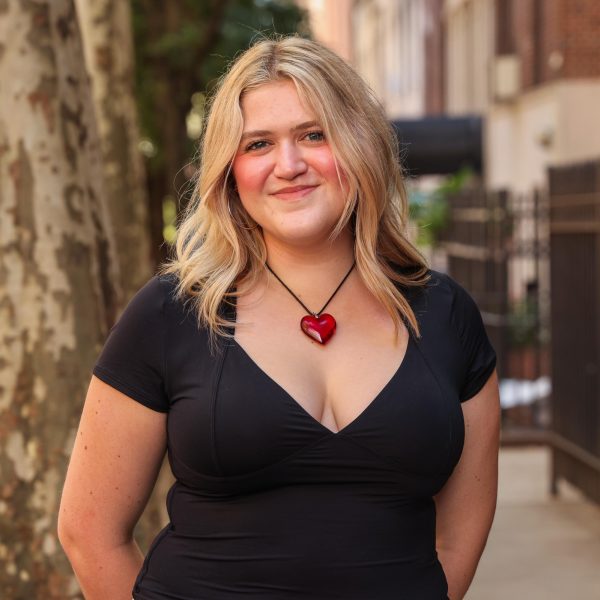“Histories We Carry” is a collection of eye-catching collages, sculptures and paintings by Estelle Maisonett, the artist-in-residence at the Latinx Project at NYU. Maisonett is known for her innovative and textured collages created by combining photographs with found objects and clothing that highlight “the materiality of the city.” The main motivation behind her work is to capture her experiences living in the Bronx and Upper Manhattan.
Her work is a snapshot of the mundane, capturing its implicit beauty while preserving the history of life in a predominantly Latinx community. Through her art, Maisonett reflects on how her upbringing in these communities has shaped her identity and how, over time, the neighborhoods she has called home have changed through gentrification.
When I first entered the gallery, I could immediately see the artist’s identity through her pieces. I felt as if an urban landscape was unfolding before my eyes, and I was being transported to the Maisonett’s childhood home.

The series “In My Hood” immediately stood out to me: sculptures crafted from three steel air ducts sitting on a bed of cinderblock. It uniquely captures the washing away of New York City’s history, as all the sculptures feature printed photographs of gentrified buildings throughout the city.
The first sculptured building, “A Queen in Queens,” highlights Maisonett’s current residence in Queens. The building has not yet faced the “inevitable” rising rent and corporatization.
The building to the right, “SOS, BX, NY,” is printed to display the architecture found in the South Bronx, where Maisonett worked from 2013 to 2018 and where her mother grew up. The detailed printing includes construction barriers and advertisements, representing the current issues unfolding in the Bronx like mass luxury developments pushing out families who have called the borough home for generations.
The final sculpture, “Dyckman, NY,” depicts a building in upper Manhattan, once home to many Dominican and European immigrants, but growing rent prices ultimately led to many immigrant families being pushed out of the area. Maisonett has a personal connection to the community, as she lived there from 2015 to 2019.
“Historical Abyss,” a mixed-media piece on panel, solidifies Maisonett as a skillful storyteller. Using an array of New York Times photo transfers, she immerses the viewer in the period between 1886-1978, capturing the colonization of Puerto Rico by the United States and Spain through news headlines and articles. This is a brilliant symbolization of the erasure of Puerto Rican history and resilience. Maisonett’s Puerto Rican identity makes this art piece incredibly personal, and I was taken aback by its honesty. She is connected to her cultural background, memorializing the past even as others have attempted to make it fade away. “In My Hood Series” and “Historical Abyss” parallel one another to simultaneously mourn the loss of and celebrate Maisonett’s heritage, which has helped shape her identity.

“Tracing Roots” stood out as the centerpiece of the exhibition. The life-size work displays Maisonett’s parents holding one another in their Bronx apartment. The couple is depicted through the use of real items, with handmade clothes shaping their outlines. These 3D elements elevate the piece by creating a deeper sensory experience, almost as if the work of art is reaching out towards the viewer. The bookshelf above the couple holds symbols of their heritage: a Lady of Guadalupe memorial candle, a Taino sculpture and books on the Bronx burning era, Puerto Rican liberation and Mexican-American history — three areas that have greatly contributed to Maisonett’s identity.
The other two works in the exhibition, “Just like grandma use to make em” and “Ventana de Luz,” are both heartfelt tributes to Maisonett’s grandmother. These two works, along with “Tracing Roots,” reveal the artist’s connection to her family and the essential role they have played in understanding herself. These beautiful depictions of family remind the viewer of how big of a hand your loved ones can have in building your inner self. Maisonett’s reflection on her family and city shows that the people and things we love help tie us to our past and our heritage, while also encouraging us to look to the future.
Estelle Maisonett’s life-sized, 3D creations provide vulnerable insight into how our culture, heritage and upbringing shape who we are.
The exhibit, which opened Feb. 9, is being displayed on the fourth floor of 20 Cooper Square. It will be open to NYU students and the public through May 10 on Tuesdays through Fridays from 11 a.m. to 5 p.m.
Contact Annie Emans at [email protected].























































































































































